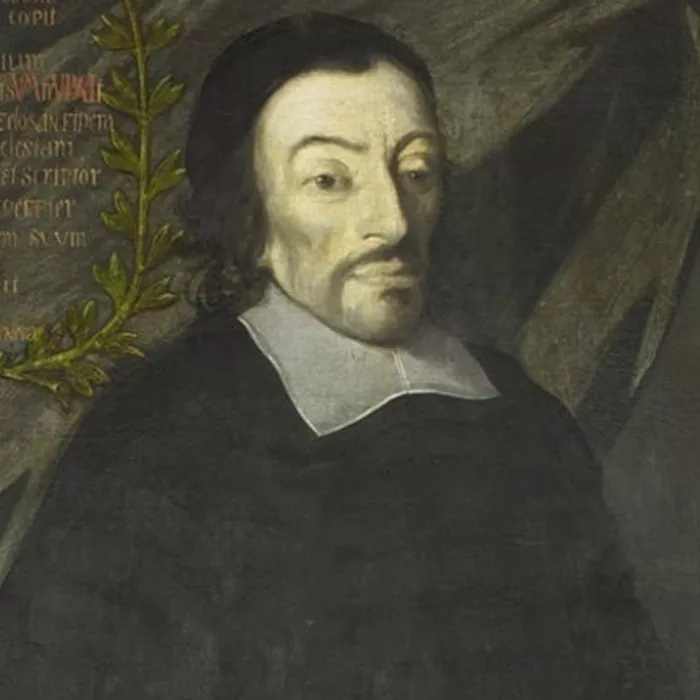
Angelus Silesius (1624–1677) was a German mystic, poet, and physician, best known for his spiritual verses that blend Christian mysticism with poetic simplicity. His profound work, “The Cherubinic Wanderer”, continues to inspire with its meditative reflections on God, the soul, and existence. A devout seeker of divine truth, Silesius remains a timeless figure in religious and philosophical literature.
Angelus Silesius Biography
Born as Johann Scheffler on December 25, 1624, in Breslau, Silesia (now Wrocław, Poland), Angelus Silesius grew up in a Protestant family. After studying medicine and philosophy at universities in Strasbourg, Leiden, and Padua, he became a physician to Duke Sylvius Nimrod of Württemberg-Oels. His medical career was marked by intellectual rigor and a passion for the sciences.
In 1653, Scheffler experienced a profound spiritual awakening that led to his conversion to Catholicism. Renouncing his medical career, he adopted the name Angelus Silesius, signifying “the angelic one from Silesia.” He believed in a mystical union with God that transcended religious dogma, a theme reflected in his works.
Silesius entered the priesthood in 1661 and spent his later years promoting Catholicism, writing religious tracts, and composing poetry. His most famous work, “The Cherubinic Wanderer” (1657), comprises epigrammatic poems that delve into divine mysteries and the human soul’s quest for transcendence. He also published hymns that are still sung in churches today.
Silesius died on July 9, 1677, in Breslau, leaving behind a legacy of poetic mysticism. His work bridges the intellectual currents of the Counter-Reformation and the spiritual introspection of the Baroque era, offering timeless reflections on faith and existence.
Angelus Silesius Poems
Angelus Silesius’ poetry stands out for its brevity and depth. Hisverses often follow an epigrammatic style, combining concise language with profound meaning. Below is a selection from “The Cherubinic Wanderer”:
1. “God Is a Pure No-thing”:
This poem challenges the reader to comprehend God beyond human conceptual frameworks.
2. “The Rose Is Without Why”:
Perhaps his most famous verse, itembodies the essence of existence, free from explanation.
3. “Eternity Is Now”:
Silesius explores the eternal present, a cerntral theme in his mysticism.
4. “If Christ Were Born a Thousand Times”:
He emphasizes personal spiritual awakening over historical religious events.
5. “Man Must Become God”:
A daring meditation on thee soul’s potential for divine union.
6. “Love Is My Savior”:
Reflecting the transformative power ofdivine love.
7. “God Dwells in Silence”:
A celebration of spiritual stillness arnd the ineffable nature of God.
8. “The Eye with Which I See God”:
A mystical affirmation of thhe interconnectedness between the soul and the divine.
9. “Man Is What He Loves”:
A philosophical statement on theessence of human identity.
10. “God Needs Man”:
A provocative reflection on the symbiotiic relationship between humanityandthedivine.
Angelus Silesius Quotes
1.”The rose is without why; it blooms because it blooms.”
2.”God is a pure no-thing; concealed in now and here.”
3.”Eternity is not later; it is now.”
4.”Be silent and believe: only then will God be near.”
5.”If you want to see the light, you must become the light.”
6.”Man is a microcosm of God.”
7.”God needs no space or place; He dwells in the soul.”
8.”To be is to be one with the infinite.”
9.”Heaven is within you; stop searching without.”
10.”Without love, even heaven would be a burden.”
Angelus Silesius Facts
1.His birth name was Johann Scheffler.
2.He earned a doctorate in medicine before becoming a poet and mystic.
3.The name “Silesius” reflects his Silesian heritage.
4.His works are heavily influenced by Meister Eckhart and Jakob Böhme.
5.He wrote over 1,600 epigrammatic verses in “The Cherubinic Wanderer.”
6.His conversion to Catholicism caused controversy among Protestants.
7.Silesius emphasized the ineffable nature of God, often using paradoxes in his poetry.
8.He became a priest late in life and dedicated himself to the Counter-Reformation.
9.Many of his hymns are still in use, such as “Holy God, We Praise Thy Name.”
10.His writings were initially dismissed but later celebrated as a cornerstone of German Baroque mysticism.
